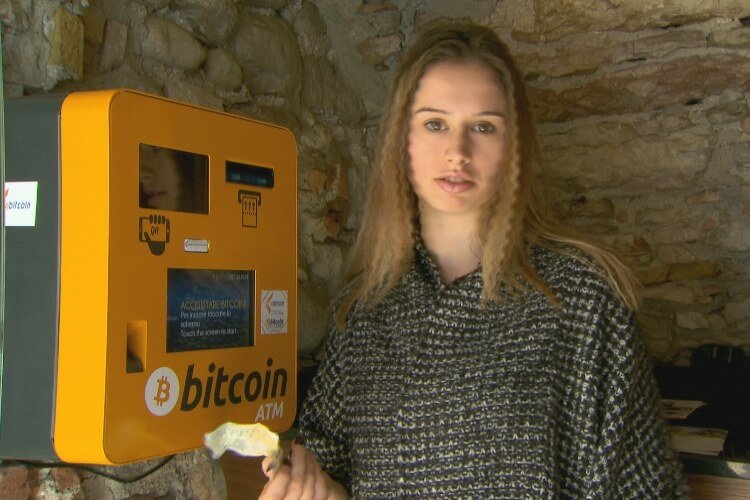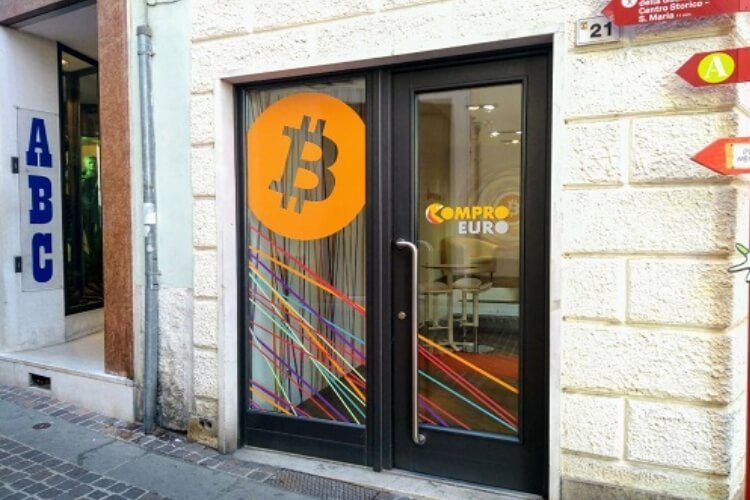Cryptocurrency for everyone: the Italian township of Rovereto launches Bitcoin Exchange points

The Italian region of Trentino-Alto-Adige has become the forging shop of Bitcoins, thanks to the pioneering work of a group of young programmers who put in circulation the most popular cryptocurrency.
In the small town of Rovereto have appeared "Buy Euro" (Compro Euro) exchange points, in which you can buy virtual Bitcoins for real euros... and spend them here, within an inch from the cashier’s desk.
Thus, in a single local community, "Bitcoinization" has spread throughout entire Italy. Innovative idea was put in practice by the manager of the company "InBitcoin" Marco Amadori, who taught his countrymen to everyday transactions in Bitcoin: buying pizza, an aperitif with friends in a cafe or refuelling at a gas station ...
Rovereto is already called "the Italian homeland of Bitcoin," and the first concrete result was a huge flow of tourists and the curious: everyone wants, if not to feel the new crispy crypto banknote, then at least contemplate it on his smartphone!
How does it work? See the report of the Italian TV channel RAINEWS 24.
In January 2009, an expert in the field of Internet technologies and cryptography named Satoshi Nakamoto published in the network a document called Bitcoin, an electronic currency distributed on the Internet. In such a way the first cryptocurrency was born, the money system called Bitcoin. This is an innovative technology, called blockchain, or a chain of blocks. A few months later, free software was distributed online as open source to ensure the distribution of the first cash payment, not guaranteed by any central issuing authority, such as the US Federal Reserve or the European Central Bank (ECB).
Marco Amadori, manager of the company "InBitcoin":
“How wonderful it would be to have a global monetary unit without the intervention of a central issuing authority," says Marco Amadori, "since the intervention of the central issuing authority was dictated by technological necessity, and not a systemic necessity. Is it not possible to make transactions by establishing obligations on mutual trust between the parties involved? You can interact, having some kind of independent economic entity or a person whom we trust. Surprisingly, all this overcomes Bitcoin - a means of payment, which can be obtained from strangers. In the sense that when the blockchain guarantees me that the transaction was performed and confirmed, my partner — the other party to the deal that concludes the contract with me, can be anyone, even spawn of the hell on the Earth, but he cannot cheat me.
Peter Todd, the Bitcoin core developer:
“It's hard to establish the reason why they do it (hide their identity) ... From the point of view of the Bitcoin, it's better that there is no central figure," says Peter Todd, the Bitcoin core developer, "because if we had an iconic figure, we would lose one of the main characteristics of Bitcoin — namely, the lack of the need for a central issuing authority. Having a leader inside Bitcoin would make the project less attractive. This is a project in which you can participate without asking permission from anyone. So it's much better”.
David Vorick, cryptocurrency expert:
"One of the most exciting aspects of the blockchain system is that, under certain conditions, it makes useless to trust each other," says cryptocurrency expert David Vorick. "Two people or two partners can interact with each other, exchanging money or other guarantees, being in full confidence that they will not get stabbed in the back. Quite the opposite happens in the traditional systems that we use today when it is necessary to resort to methods of control, namely, to resort to police control or to the judicial system. In addition, if someone intends to put a knife in the back, then these government structures are required, in order to guarantee justice of a certain type. The blockchain system makes this useless since it is designed in such a way as to stop the scam. We are talking about huge potential: today we use the blockchain technology to manage money, but in the future, perhaps, it will be used for other purposes”.
In Italy, too, in the Bitcoin sphere, operate people and companies that do not set themselves purely financial goals. In Milan, Blockchain Lab has been operating for several years now — an information and design center and a cultural site, and has managed to attract the attention of a wide and diverse public, ranging from programmers to sociologists, including some representatives of the traditional financial sphere, who have been following the Bitcoin process for a long time with great interest.
Alessandro Curioni, a writer:
“Indeed, there are about 800 cryptocurrencies, says the writer Alessandro Curioni, but if we take into account their total capitalization, which is 13 billion dollars globally, and then Bitcoin accounts for 12.5 billion. The question is how much our financial system will be ready to accept the fact that there are currencies outside its control. I believe that the success of Bitcoin is also determined by the psychological factor - there is no central body that personally controls me. If tomorrow a bank starts issuing a cryptocurrency, it will become a regular currency. Thus, there will always be a bank that controls me. While the cryptocurrency is completely torn off, being tied to the dark internet, which guarantees the anonymity of transactions and allowing to achieve a very high level of privacy protection. Therefore, it is very difficult to destroy this system”.
Continuation of the interview with Marco Amadori:
— What is the area of distribution of cryptocurrency? Local?
Marco Amadori:
“Yes, it was launched here a couple of years ago. This is an idea born here, originated on the spot. We held a technical seminar and established a research unit. I proposed to move all the developments into a practice area. I asked the owner of the local pizzeria whether he was ready to accept from us as a means of payment Bitcoin because we went there to eat with the whole group of researchers. The owner agreed, and his example was followed by other pizzerias. At our prompt, a big business started to spin around”.

“It turns out that the global Bitcoin process has worked at the local level?”
Marco Amadori:
“Yes, the famous concept of geolocalization is a term that has become obsolete. However, it may again be possible to put it into circulation. Yes, the idea was this — a matter of trust, in a slightly limited area like Rovereto or, in the broader sense, the Trentino region. When links are closer at the local level, it is much easier to instil trust”.
“Well, and the banks, where will they go?”
Marco Amadori:
“Well, the banks will not disappear ... but their influence will decrease. There will be approximately the same thing that happened in the field of communications with the advent of the Internet: the newspapers did not disappear, but they underwent changes. Currently, we derive news mainly from the Internet, but the newspapers have retained their role. Banks will change in the direction of reducing their role”.

A girl at a distributor of Bitcoins.
I insert a traditional euro banknote in this distributor machine and it exchanges it with Bitcoins, transferring them to my smartphone, from which I can then make payments and make purchases online or in various stores.